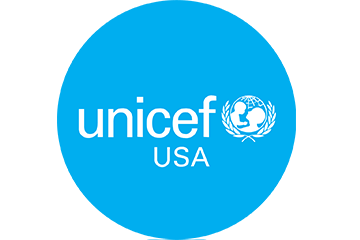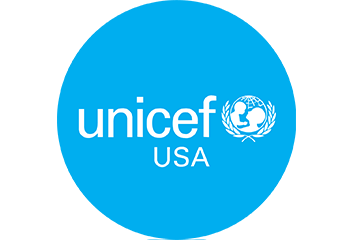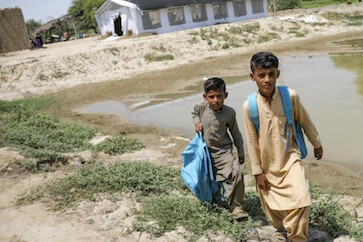Quality education for girls is proven to break the cycle of poverty and increase countries’ socio-economic prosperity and well-being. Globally, high school graduates are less likely to marry young and more likely to earn higher incomes, building better futures for themselves and their families. Educated women also bring different skills and perspectives to the workplace, positively impacting GDP and productivity levels. Recognizing the essential role education plays to prepare girls for successful careers, UNICEF and partners like Zonta International, SAP, Clé de Peau Beauté, Gucci and Chloé are equipping millions of girls around the world with the 21st-century skills needed to develop a stronger workforce.
Women play an essential role in many global industries. For example, women make up about 70 percent of the global health workforce and are at the forefront in the fight against the COVID-19 pandemic in a variety of roles from administering vaccines to dispelling public health misinformation within communities. Yet women and girls have experienced setbacks due to the pandemic that could impact the future global health workforce and other industries critical for societal and economic security.
The COVID-19 pandemic threatens to reverse decades of progress in girls’ education levels
At their peak, COVID-19 school closures disrupted the educations of more than 1.6 billion children; more than 616 million students worldwide are still impacted by full or partial closures. For some — particularly girls — the setbacks could be permanent. It is estimated that 11 million girls may never return to school.
In 1970, girls in the most underserved communities completed, on average, less than three years of formal education. By 2019, this figure had increased to nine years. Despite gains made by previous generations in equitable access to education, unless they receive support, many of today’s girls may lose the opportunity to reach their full potential.
Secondary education is particularly important for girls and the well-being of their communities. Increased rates of girls’ education lead to better health outcomes for women and their children, including decreased child mortality rates. In addition, educating girls reduces inequalities, increases action to combat climate change, improves civic participation and creates more inclusive economic growth. One study found that every $1 spent on girls’ rights and education would generate a return of $2.80 — equivalent to billions of dollars in added GDP. Girls are the workers and business leaders of tomorrow: investing in secondary education for girls is critical to developing a prosperous global economy and society.
Nineteen-year-old Manuela Christine arrives for an orientation session on the second day of her two-year midwifery course at Kuluva Nursing and Midwifery School at Kuluva Hospital in Uganda’s Arua District. © UNICEF/UN0598240/Wamala
UNICEF works with partners to ensure every girl can get the quality education and skills training she needs to thrive. Zonta International has been helping UNICEF advance the status of women and children globally through education, health and protection services since 1972.
“One of the many programs Zonta and UNICEF USA have partnered on is Let Us Learn Madagascar, which has helped more than 350,000 children and families and ensures girls are able to stay in school and realize their full potential,” said Sharon Langenbeck, President of Zonta International and Zonta Foundation for Women. The program offers teacher training, scholarships and cash transfers to help cover school fees, and catch-up classes for children who missed out on school during the pandemic, among other key interventions.
“For Zonta, partners like UNICEF who are focused on long-term sustainable change and who have a proven track record of success, are critical to our mission of a more equitable world for women and girls,” said Langenbeck.
A quality education unlocks a girl’s potential
UNICEF partner SAP is also addressing the gaps in secondary education. Working together since 2019, UNICEF and SAP plan to reach more than 1.5 million young people in India, Turkey and Vietnam with 21st-century life skills training by the end of 2022. Partnering with government officials, UNICEF and SAP are addressing workforce readiness by equipping underserved youth — particularly girls — with both digital and life skills.
“Powering equitable access to quality education is a collective action across the world,” says Alexandra van der Ploeg, Head of Corporate Social Responsibilty, SAP SE. “It’s not about reacting to a moment but dedicating our expertise and resources to create long-lasting, systemic change. We are proud to partner with UNICEF to generate inclusive opportunities for girls and young people worldwide. Together, we are aiming to prepare and equip the world’s youth with both the hard and soft skills needed for the 21st century.”
Matram, 13, at the blackboard of the Noma school, in Maradi, southern Niger in October 2021. © UNICEF/UN0535953/Dejongh
Other impactful partners who play an important role in supporting girls’ education and gender equity work include Clé de Peau Beauté, Gucci and Chloé. Their consumer-facing campaigns raise critical funds and awareness for gender equity and girls’ education.
Funds from the sale of Clé de Peau Beauté’s The Serum help UNICEF promote inclusive education in science, technology, engineering and math (STEM), along with skills such as self-confidence, teamwork and decision-making. Proceeds from the sale of items in Chloé’s Girls Forward capsule collections help fund UNICEF initiatives promoting gender equality. Gucci, a UNICEF partner since 2005, has supported education initiatives in sub-Saharan Africa and Asia along with gender empowerment work and, more recently, the equitable distribution of vaccines to prevent the spread of COVID-19.
The way forward
When girls have equitable access to quality education, we all benefit. UNICEF and partners won’t stop working to ensure our progress is not lost, and every child has the opportunity to reach their full potential.
UNICEF is on the ground in 190 countries and territories, working with partners to meet the needs of the most vulnerable children. Learn more about how civil society and corporate organizations can partner with UNICEF USA to support UNICEF’s global mission for children.
Top photo: A girl student works in the computer room at Lycée Mamie Adjoua in Bingerville, southern Côte d’Ivoire on February 11, 2022. © UNICEF/UN0592549/Diarassouba





